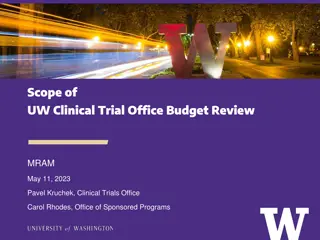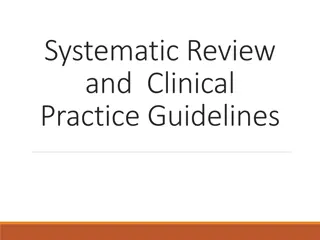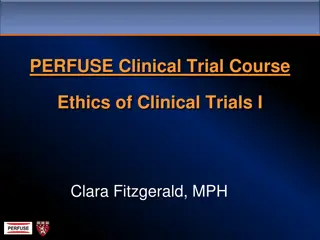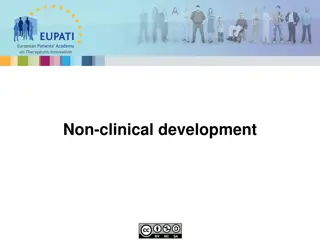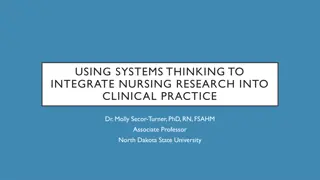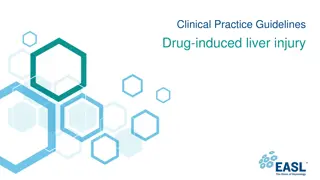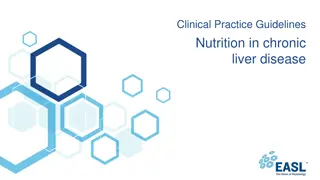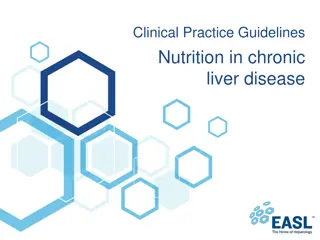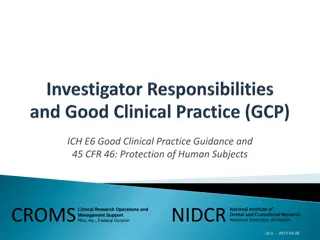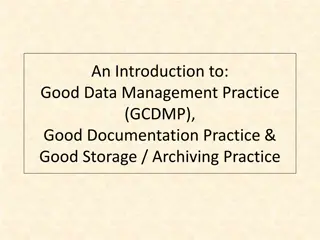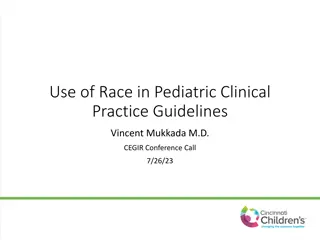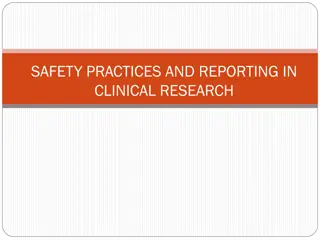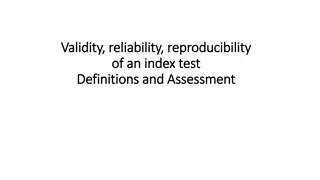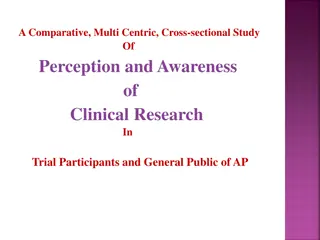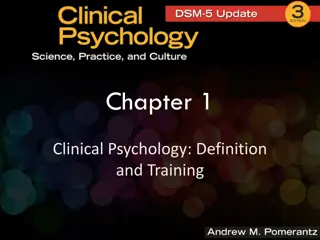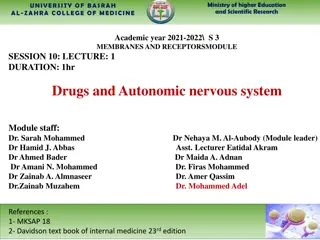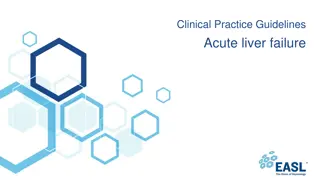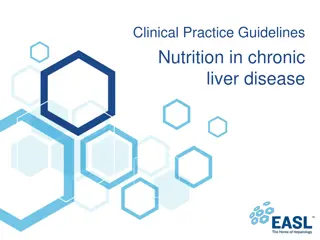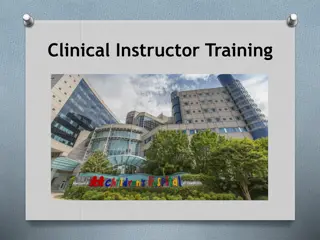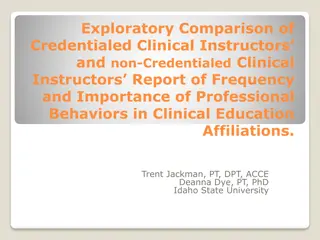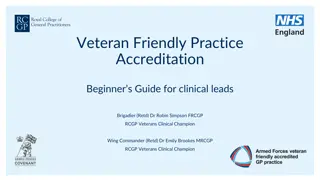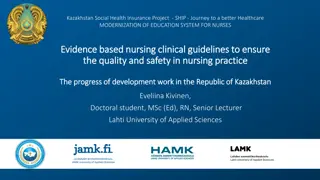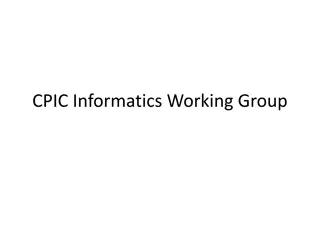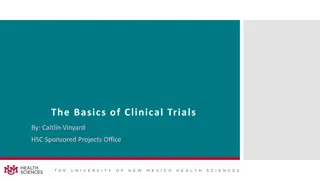Overview of UW Clinical Trial Office Budget Review
UW Clinical Trial Office conducts budget reviews to ensure compliance and financial accountability in clinical trials. The office collaborates with various departments to manage billing compliance, financial risks, and institutional policies. The primary focus is on avoiding patient billing errors,
0 views • 17 slides
India Alliance Clinical & Public Health fellowship in India
India Alliance Clinical & Public Health fellowship in India\n\nIndia Alliance Clinical and Public Health Research Fellowships are for Health researchers with an MD, MS, MPH, or an equivalent clinical or public health degree, who can apply for the DBT\/Wellcome Trust India Alliance Clinical and Publi
0 views • 5 slides
Ethical Issues in Clinical Pharmacy Research by Dr. Haider Raheem Mohammad
Research ethics play a crucial role in clinical trials and therapeutic research in the field of pharmacy. From discovery to validation, all medicines undergo rigorous evaluation processes to ensure safety, efficacy, and freedom from adverse effects. Clinical trials in both animals and humans are ess
0 views • 20 slides
Understanding Systematic Reviews, Meta-analysis, and Clinical Practice Guidelines
Explore the importance of systematic reviews, critical appraisal questions, meta-analysis, and clinical practice guidelines in the healthcare field. Learn about the process of appraising systematic reviews, the significance of meta-analysis, and the benefits of following clinical practice guidelines
1 views • 16 slides
Advanced Clinical Practice Framework and Pillars of Practice
The document discusses the advanced clinical practice framework and the four pillars of practice which include leadership & management, clinical practice, education, and research. It emphasizes the importance of core capabilities and area-specific competence in advanced clinical practice. The role o
2 views • 8 slides
Objective Structured Clinical Examination (OSCE): A Modern Approach to Assessing Clinical Competence
The Objective Structured Clinical Examination (OSCE) is a modern examination method widely used in the field of health science to evaluate clinical skill performance. It involves stations where medical students interact with simulated patients to demonstrate competencies such as history taking, phys
1 views • 40 slides
NIMH Clinical Research Education and Monitoring Program Overview
NIMH's Clinical Monitoring and Clinical Research Education, Support, and Training Program (CREST) aims to ensure the proper conduct, recording, and reporting of clinical trials. This program includes clinical monitoring plans, guidelines for site monitoring activities, and independent clinical monit
1 views • 29 slides
Understanding Ethics in Clinical Trials: A Comprehensive Overview
Explore the historical context, important ethical guidelines, and the ethical framework with 7 principles in the field of clinical trials. Learn about key trials, ethical considerations, and guidelines governing human subject research in clinical medicine. Delve into the critical aspects such as inf
1 views • 15 slides
Understanding Non-Clinical Development in Therapeutic Innovation
The European Patients Academy on Therapeutic Innovation focuses on the non-clinical development phase of medicine, delving into efficacy assessment, safety evaluation, and manufacturing process considerations. Non-clinical studies are essential for decision-making in clinical trials, marketing appli
1 views • 26 slides
Integrating Nursing Research into Clinical Practice with Systems Thinking
Dr. Molly Secor-Turner emphasizes the importance of evidence-based practice (EBP) in nursing. EBP, derived from rigorous research, leads to quality patient outcomes by aligning services with current knowledge. The process involves identifying problems, critiquing evidence, implementing recommendatio
0 views • 21 slides
EASL Clinical Practice Guidelines for Drug-Induced Liver Injury Management
These slides provide an in-depth overview of the EASL clinical practice guidelines on managing drug-induced liver injury. The guidelines cover epidemiology, key recommendations, future prospects, new biomarkers, unresolved issues, and unmet needs. Recommendations are based on evidence levels from th
0 views • 44 slides
Importance of Communication and Counseling Skills in Clinical Settings
Dr. Leena Baghdadi, an Assistant Professor and Clinical Epidemiologist, emphasizes the significance of effective communication and counseling skills in clinical practice. The content discusses the objectives of understanding these skills, barriers, and practical examples of counseling. Highlighted b
0 views • 27 slides
Clinical Practice Guidelines on Nutrition in Chronic Liver Disease
Comprehensive overview of the EASL clinical practice guidelines on nutrition in chronic liver disease, first presented at the International Liver Congress 2018. These guidelines, published in the Journal of Hepatology, offer key recommendations and address unresolved issues in patient management. Ab
0 views • 49 slides
Clinical Practice Guidelines: Nutrition in Chronic Liver Disease Overview
These slides provide a comprehensive overview of the EASL clinical practice guidelines on nutrition in chronic liver disease. The guidelines were first presented at the International Liver Congress 2018 and will soon be published in the Journal of Hepatology. The content covers methods of grading ev
6 views • 37 slides
Understanding Evidence-Based Medicine and Clinical Decision-Making
European Patients Academy on Therapeutic Innovation emphasizes the importance of Evidence-Based Medicine (EBM) in providing optimum clinical care. EBM involves systematic review and utilization of clinical research for informed decision-making, benefiting patients in disease management and treatment
7 views • 20 slides
Essential Aspects of the Clinical Interview in Psychology
Clinical interviews play a crucial role in the assessment conducted by clinical psychologists, showcasing essential qualities like validity, reliability, and clinical utility. Understanding the importance of feedback and honing general and specific skills as an interviewer are key components in cond
1 views • 17 slides
Enhancing Human Subjects Research Through NIH Policy Changes
The National Institutes of Health (NIH) is implementing reforms and initiatives to improve the stewardship of research involving human subjects, particularly in the context of clinical trials. These changes include new forms for data collection, training in Good Clinical Practice, use of a single In
0 views • 13 slides
Guidelines for Personal Tutoring in a Clinical Setting
Melvyn Jones, a Clinical Associate Professor at UCL, shares valuable insights on personal tutoring in a clinical context. The guidelines cover setting ground rules, one-to-one meetings, dealing with troubled students, addressing failing students, handling non-engagement, supporting overseas students
0 views • 12 slides
Clinical Research Guidelines and Regulations Overview
Clinical research encompasses various guidelines and regulations to ensure the protection of human subjects and the credibility of study results. Key aspects include Good Clinical Practice (GCP) standards, Title 45 of the Code of Federal Regulations (CFR) Part 46, and additional CFR sections for cli
0 views • 46 slides
Essential Elements of Clinical Trial Protocols
Understanding the key components of a clinical trial research protocol is essential for conducting successful studies. This includes identifying session objectives, discussing trial protocol contents, exploring observational study elements, and learning about reporting guidelines. Study objectives f
1 views • 25 slides
Understanding Practice Drift in Nursing: Risks and Consequences
Explore the concept of practice drift in nursing, where nurses may deviate from standards leading to unsafe practice. Learn how to identify and prevent practice drift, understand scope of practice, and adhere to state regulations. Discover the importance of following the Model Nurse Practice Act and
0 views • 35 slides
Ohio Clinical Alliance: Transforming Clinical Experiences
The Ohio Clinical Alliance, through collaborative partnerships, aims to enhance clinical preparation for educators. The leadership team comprises various representatives and organizations committed to improving student learning. Their activities include retreats and meetings to ensure effective comm
0 views • 27 slides
Importance of Good Data Management Practices in Clinical Research
Learn about Good Data Management Practice (GCDMP), Good Documentation Practice, and Good Storage & Archiving Practice in clinical research. Understand the significance of data, key data collection processes, best practices for reporting data in CRF, importance of documentation, and data storage/arch
0 views • 40 slides
Understanding Race in Pediatric Clinical Practice Guidelines
Clinical Practice Guidelines (CPGs) play a crucial role in shaping healthcare practices. This article delves into the complexities of incorporating race into pediatric clinical guidelines, emphasizing the societal constructs and implications rather than biological determinants. Critical Race Theory
0 views • 17 slides
Safety Practices and Reporting in Clinical Research
Safety practices and reporting in clinical research are crucial for ensuring the rights, safety, and well-being of trial subjects. This includes monitoring safety, reporting adverse events promptly, and following regulatory requirements. Investigators play a vital role in assuring subject safety and
0 views • 33 slides
Enhancing Clinical Trials through ICH E6 Renovation
Explore the Clinical Trials Transformation Initiative's efforts in updating ICH E6 guidelines to improve global clinical trials. Learn about CTTI's findings, insights from stakeholders, and discussions on the necessary updates for ICH E6. Engage with industry experts and regulatory authorities to un
0 views • 65 slides
Understanding the Importance of Validity, Reliability, and Reproducibility in Clinical Measurements
Clinical practice involves measuring quantities to aid in diagnosis, predict patient outcomes, and serve as study endpoints. Errors in measurements can lead to inaccurate results and affect clinical decisions. Trueness and precision, accuracy, bias, and method comparison are essential concepts in as
0 views • 25 slides
Perception and Awareness of Clinical Research in Trial Participants and the Public of Andhra Pradesh
This study focuses on understanding the perception and awareness of clinical research among trial participants and the general public in Andhra Pradesh. It highlights the importance of creating awareness about clinical research, previous study results, public attitudes towards clinical trials, and e
0 views • 24 slides
Understanding Clinical Psychology: Definition, Training, and Models
Clinical psychology, first introduced in 1907, encompasses a diverse field focusing on the study, assessment, and treatment of psychological issues. The APA Division 12 defines clinical psychology as integrating science, theory, and practice to understand and alleviate maladjustment. Training typica
0 views • 26 slides
Understanding Autonomic Nervous System and Clinical Applications in Medicine
This academic session covers the effect of autonomic nervous system stimulation on various systems, clinical diseases, pathophysiological changes, disease management guidelines, and clinical applications of autonomic drugs. Common clinical applications of autonomic receptors agonists and antagonists
0 views • 23 slides
Guidelines for Therapeutic Recreation Internships
The guidelines for internships in therapeutic recreation aim to help students apply academic knowledge in practice, enhance clinical skills under supervision, assess competencies, understand TR in health services, practice ethical behaviors, and delve into critical issues. The terms include definiti
0 views • 37 slides
Clinical Practice Guidelines for Acute Liver Failure Management
These slides provide a comprehensive overview of the EASL clinical practice guidelines for the management of acute (fulminant) liver failure, published in the May 2017 issue of the Journal of Hepatology. Covered topics include background, guidelines, key recommendations, and considerations for futur
0 views • 57 slides
EASL Clinical Practice Guidelines: Nutrition in Chronic Liver Disease Overview
These slides provide a detailed overview of the EASL clinical practice guidelines on nutrition in chronic liver disease, first presented at the International Liver Congress 2018. The guidelines cover key recommendations, grading evidence, and unresolved issues in patient management. The content is i
0 views • 49 slides
Clinical Instructor Training and Nursing Education Guidelines
Clinical Instructor Training program and Nursing Education guidelines at Vanderbilt University Medical Center including training requirements, feedback procedures, conflict of interest policies, clinical reminders, bedside RN responsibilities, and patient assignment protocols.
0 views • 18 slides
Comparison of Professional Behaviors in Clinical Education
Professional behavior characteristics play a crucial role in enhancing student learning during clinical education. This study examines the differences in reported importance and frequency of professional behaviors between credentialed and non-credentialed clinical instructors. The background outline
0 views • 28 slides
Veteran-Friendly Practice Accreditation: A Beginner's Guide for Clinical Leads
Congratulations on achieving veteran-friendly practice accreditation! This guide provides essential information for clinical leads to enhance medical care for veterans, including access to specific NHS services and reducing practice workload. Learn the role of the clinical lead, expectations of an a
0 views • 29 slides
Enhancing Clinical Academic Collaboration Between Universities and NHS Trusts
Clinical academics play a crucial role in integrating clinical practice, research, and education within the NHS. Collaboration between universities and NHS trusts is key to ensure clinical academics address the right questions for patient care and societal benefit. Challenges include an aging clinic
0 views • 29 slides
Modernizing Nursing Education in Kazakhstan Through Evidence-Based Clinical Guidelines
The Kazakhstan Social Health Insurance Project (SHIP) aims to improve healthcare by modernizing the education system for nurses. This involves implementing evidence-based nursing clinical guidelines to enhance the quality and safety of nursing practice in the country. The project focuses on the deve
0 views • 14 slides
CPIC Informatics Working Group Overview
The CPIC Informatics Working Group focuses on the informatics aspects of CPIC guidelines and the clinical implementation of pharmacogenetics. This group aims to support the adoption of CPIC guidelines by addressing technical barriers and creating translation tables from genotype to phenotype to clin
0 views • 7 slides
Understanding Clinical Trials: Phases, Types, and Definitions
Clinical trials play a crucial role in advancing medical research and treatment options. This comprehensive guide covers the basics of clinical trials, including their definition, phases, types, and key definitions like IND, IDE, NDA, and more. Discover how different phases of trials work, the vario
0 views • 16 slides
